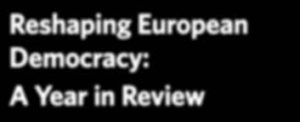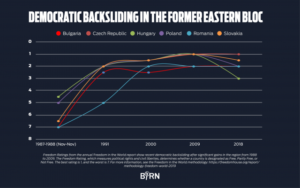 In recent years some European states have suffered dramatic regression, while others have experienced more subtle forms of democratic erosion. In response to this challenge, new European Commission President Ursula von der Leyen has called for a “new push for European democracy.” But there will be no silver bullet to rescue or transform European democracy, according to a new Carnegie analysis.
In recent years some European states have suffered dramatic regression, while others have experienced more subtle forms of democratic erosion. In response to this challenge, new European Commission President Ursula von der Leyen has called for a “new push for European democracy.” But there will be no silver bullet to rescue or transform European democracy, according to a new Carnegie analysis.
Rather than attempt to address every dimension of democracy across Europe, it makes sense to select a number of concrete policy ideas, the authors adds, suggesting at least six constructive, practical ways that European leaders can begin bolstering European democracy.
- Craft a compelling democratic narrative against the rise in illiberal values.
- Establish a more democratic way to elect European leaders.
- Foster a more transnational form of European party politics.
- Improve direct citizen consultations and democratic participation.
- Embrace a more positive approach to digital democracy that not only manages the risks of new technologies but also harnesses their potential.
- Strengthen public participation through a revamped European Citizens’ Initiative (ECI).
 The report echoes many of the concerns raised in the strategic plan for reversing backsliding released this week by Brookings.
The report echoes many of the concerns raised in the strategic plan for reversing backsliding released this week by Brookings.
In terms of a compelling democratic narrative, the dominant communication style of European civil society organizations that promote democratic and liberal causes has exhibited three weaknesses, the paper suggests:
- First, civil society actors tend to use facts alone to support their messages. Yet relevant research shows that using facts in isolation, without relating them to underlying values, is not typically persuasive.
- Second, civil society often reinforces the negative framing devices used by authoritarians. Civic actors tend to use the very frames and narratives authoritarians employ as part of their efforts to contradict them….
- Third, civil society organizations tend to use clunky terminology that the public cannot easily grasp. Reformers need to be able to break down complicated concepts into simpler framing devices and metaphors that the public can intuitively understand……
One of the worst things the EU’s new leaders could do would be to launch grandiloquent initiatives that fail to deliver meaningful and tangible change, says the report, part of the Reshaping European Democracy project, an initiative of Carnegie’s Democracy, Conflict, and Governance Program and Carnegie Europe.* RTWT
 Check out the engaging discussion between Tom Carothers of @carnegieendow and National Democratic Institute staff at NDI’s Washington, D.C. headquarters for this week’s #QuoteOfTheWeek #polarization #democracies #DemocraciesDivided.
Check out the engaging discussion between Tom Carothers of @carnegieendow and National Democratic Institute staff at NDI’s Washington, D.C. headquarters for this week’s #QuoteOfTheWeek #polarization #democracies #DemocraciesDivided.
*Coordinator: Richard Youngs is a senior fellow in the Democracy, Conflict, and Governance Program at Carnegie Europe. Contributors: Stephen Boucher is the founder of Dreamocracy. Israel Butler is head of advocacy at the Civil Liberties Union for Europe (Liberties). Maarten de Groot is project manager of the Future of Democracy Program at the Bertelsmann Stiftung. Elisa Lironi is senior manager for European democracy at the European Citizen Action Service. Sophia Russack is a researcher in the Institutions Unit at the Center for European Policy Studies. Corina Stratulat is a senior policy analyst and head of the European Politics and Institutions Program at the European Policy Center. Anthony Zacharzewski is president of the Democratic Society.







